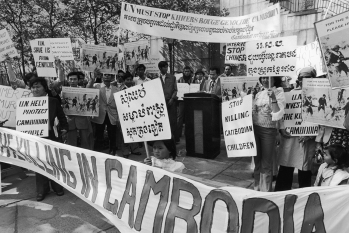
After releasing the Seoul Statement just before the start of the Fourth Lausanne Congress on World Evangelization held in Incheon, Korea from September 22 to 28, the document’s editorial team adjusted two paragraphs that speak to the issue of the Church’s response to homosexuality. A spokesperson commented that more minor changes are possible.
In the first of the two paragraphs, the new version changed the wording that spoke of “many churches” and instead now simply refers to “Christian communities”. It also removed references to “ignorance and prejudice”, “discrimination and injustice” and “harm”, while maintaining the need for repentance for shortcomings in some churches that have not treated brothers and sisters in Christ who are same-sex attracted with love.
Paragraph 69 as released on September 22:
We recognise that a number of people, both within and outside the church, experience same-sex attraction, and that for some, this is the only or dominant attraction. The biblical insistence that Christians must resist temptation and so maintain sexual holiness, in both desire and behaviour, applies equally to heterosexually attracted individuals as it does to same-sex attracted persons. We acknowledge, however, that Christians who are same-sex attracted face challenges in many local churches due to ignorance and prejudice, and have consequently suffered discrimination and injustice within Christian communities. We repent of our failures and lament the harm this has done to our brothers and sisters in the body of Christ.
New version of paragraph 69:
We recognise that a number of people, both within and outside the church, experience same-sex attraction, and that for some, this is the only or dominant attraction. The biblical insistence that Christians must resist temptation and so maintain sexual holiness, in both desire and behaviour, applies equally to heterosexually attracted individuals as it does to same-sex attracted persons. We acknowledge, however, that Christians who are same-sex attracted face challenges even in Christian communities. We repent of our lack of love towards our brothers and sisters in the body of Christ.
Meanwhile, only a single word was changed in paragraph 70 where the new version removed
"faithful" when referring to believers who experience same-sex attraction.
Paragraph 70 as released on September 22:
We urge Christian leaders and local churches to recognise within our communities the presence of faithful believers who experience same-sex attraction, and to support them in their discipleship by pastoral care and by developing healthy communities of love and friendship.
New version of paragraph 70:
We urge Christian leaders and local churches to recognise within our communities the presence of believers who experience same-sex attraction, and to support them in their discipleship by pastoral care and by developing healthy communities of love and friendship.
Christian Daily Korea reported that there were reactions from the religious community in Korea regarding the paragraphs in question, saying “some local churches or Christian communities may have done wrong to homosexuals, but this presents it as if many local churches and Christian communities did wrong, even though most local churches and Christian communities did not.”
However, asked by Christian Daily International about the change during Tuesday’s press conference, Lausanne’s spokesperson said the edit was in fact meant to be made before the release of the Seoul statement, calling it “an oversight”. He also added that “the adjustment was not significant.”
‘Like any editorial process, there may be changes’
The release of the Seoul Statement before rather than after the event raised questions from some participants who said they were somewhat taken by surprise. Concerns included the timing of the release mere hours before the event kicked off, which didn’t give participants sufficient time to study the 20-page document with 97 paragraphs.
It was also not immediately clear how the feedback that will emerge from the discussions and interactions of the thousands of participants of the Congress would be processed, so that they feel ownership of the document, which due to its name will likely be regarded by the wider public as reflecting the collective view of the Congress.
Likely anticipating these concerns, Program Director David Bennett explained during the first press conference held before the opening ceremony that unlike its predecessors that were published following the event, the statement is meant to “inform and inspire” participants’ deliberations throughout the gathering rather than summarize what was discussed.
As earlier reported by Christian Daily International, Bennett emphasized that the purpose of the Seoul Statement is not to be a new stand-alone response to the missional challenges that the global Church is facing today.
Instead, it “stands as part of the larger collection of key documents within the Lausanne Movement, building on the legacy of the Lausanne Covenant, the Manila Manifesto, and the Cape Town Commitment. It is designed not to replace, but to complement these foundational documents, providing fresh insights into contemporary theological and missional challenges.”
Lausanne’s spokesperson added in his comments regarding the adjustments that there are broader conversations about issues that are of specific concern to the Korean Church, and that he would therefore “anticipate that there may be more [changes] but the finality of it is never going to be 'dipped in amber' and called ‘done’ perhaps.”
“It is not the Congress’ statement, it is not one of the foundational documents that we are pinning everything on. And so, like in any editorial process, there may be changes, but those changes are not substantive or significant, at least from an editorial perspective.”
‘Remember there are always people in the room who struggle with this issue’
The issue of human sexuality and the sexual revolution that marks today’s secular culture continues to pose a challenge to many pastors and Church leaders who seek to biblically and pastorally respond to those who struggle with their sexual attraction or identity.
During the Congress’ Monday evening plenary with the theme Recommitment – Calling the Global Church Towards Faithfulness in Word & Deed, Vaughan Roberts, rector at St. Ebbe’s Church in Oxford, addressed the issue of homosexuality, stating that it is not according to God’s design. But as someone who himself struggled with same-sex attraction, he also challenged Christian leaders to consider how they talk about such topics in public and in the church.
“When we speak about these issues in church, will you always remember that people you’re talking about are in the room? Does the tone and manner in which you speak invite them to be honest and open, or does it force them into secret, lonely isolation?” he reminded the thousands of participants.
“So how should we respond to the sexual revolution?” he asked. "We should respond with Christ. Don't just preach morality. Certainly, don't just preach condemnation. Preach and live Christ for the glory of His name.”





